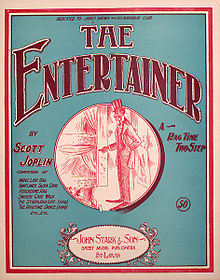The Entertainer (rag)
| The Entertainer | |
|---|---|
| by Scott Joplin | |
 First edition cover of "The Entertainer" | |
| Form | Ragtime, two step |
| Published | 1902 |
| Publisher | John Stark & Son |
| Duration | Typically 3:53 |
"The Entertainer" is a 1902 classic piano rag written by Scott Joplin.[1]
It was sold first as sheet music by John Stark & Son of St. Louis, Missouri,[2] and in the 1910s as piano rolls that would play on player pianos.[1] The first recording was by blues and ragtime musicians the Blue Boys in 1928, played on mandolin and guitar.[1]
As one of the classics of ragtime, it returned to international prominence as part of the ragtime revival in the 1970s, when it was used as the theme music for the 1973 Oscar-winning film The Sting. Composer and pianist Marvin Hamlisch's adaptation reached No. 3 on the Billboard pop chart and spent a week at No. 1 on the easy listening chart in 1974.[3] The Sting was set in the 1930s, a full generation after the end of ragtime's mainstream popularity, thus giving the inaccurate impression that ragtime music was popular at that time.
The Recording Industry Association of America ranked it at No. 10 on its "Songs of the Century" list.[1]
Music
"The Entertainer" is subtitled "A Rag Time Two Step", which was a form of dance popular until about 1911, and a style which was common among rags written at the time.
Its structure is: Intro–AA–BB–A–CC–Intro2–DD.[2]
It is primarily set in the key of C major; however, for the C section (commonly referred to as the "Trio"), it modulates to F major, then shifts back to C major for the D section. The B section contains an indication that the melody is to be played an octave higher on the repeat.
In the June 7, 1903,
Suggested by the rag's dedication to "James Brown and his Mandolin Club", author Rudi Blesh wrote that "some of the melodies recall the pluckings and the fast tremolos of the little steel-stringed plectrum instruments".[5] Stark issued an arrangement of the piece for two mandolins and a guitar.[2]
Publication
The copyright on "The Entertainer" was registered December 29, 1902, along with two other Joplin rags, "A Breeze from Alabama" and "Elite Syncopations", all three of which were published by Stark.[2] The centerpiece of the original cover art featured a minstrel show caricature of a black man in formal attire on a theater stage.[citation needed]
Popularity and legacy
In November 1970,
See also
References
- ^ ISBN 9781442254497.
- ^ ISBN 0-486-25922-6.
- ISBN 0-89820-149-7.
- ^ Unknown (April 27, 1904). ""Scott Joplin's Musicale"". Evening Herald (Parsons, Kansas). Vol. 12, no. 57. W.C. Moore. Retrieved August 15, 2022.
- ^ Rudi Blesh, p. xxiv, "Scott Joplin: Black-American Classicist", Introduction to Scott Joplin Collected Piano Works, New York Public Library, 1981
- ^ "Scott Joplin Piano Rags Nonesuch Records CD (w/bonus tracks)". Nonesuch.com. Retrieved March 19, 2009.
- ^ "Nonesuch Records". Nonesuch.com. Retrieved March 19, 2009.
- ^ Billboard 1974a, p. 61.
- ^ a b LA Times n.d.
- ^ Rich 1979.
- ^ "Charis Music Group, compilation of cue sheets from the American Top 40 radio Show" (PDF). Retrieved September 5, 2009.
- ^ Billboard 1974b, p. 64.
- ^ Kronenberger, John (August 11, 1974). "The Ragtime Revival—A Belated Ode to Composer Scott". The New York Times.
- ^ Record World Magazine. July 1974, quoted in: Berlin, Edward A. (1996). King of Ragtime: Scott Joplin and His Era, p. 251.
- ^ Neely, Daniel Tannehill (Spring 2005). "Soft Serve: Charting the aural promise of ice cream truck music" (PDF). Esopus (4). New York City. Archived from the original (PDF) on February 5, 2009.
Sources
- "Entertainment Awards Database". Los Angeles Times. Archived from the original on January 18, 2012. Retrieved March 17, 2009.
- "Best Selling Classical LPs". Billboard. No. September 28, 1974. Nielsen Business Media, Inc. 1974a. Retrieved July 29, 2011.
- "Hot 100". Billboard. No. May 18, 1974. Nielsen Business Media. 1974b. Retrieved August 5, 2011.
- Rich, Alan (1979). "Music". New York (December 24, 1979): 81. Retrieved August 5, 2011.
External links
 Media related to The Entertainer at Wikimedia Commons
Media related to The Entertainer at Wikimedia Commons- Musical score and MIDI file at the Mutopia Project
- Sheet music and mp3 at mfiles.co.uk (interactive version requires Sibelius Scorch)
- Free MP3 download and video
- Free typeset sheet music from Cantorion.org
